

Early Years Setting. Why Movement is Essential in Early Childhood. With so few years under their belts, my 3- and 6-year-old daughters are still learning to inhabit their bodies. They are learning how to maneuver themselves physically, how to orient themselves in space. As Vanessa Durand, a pediatrician at St. Primary school shake-up to focus on ‘play-led’ learning. Children at primary schools would not study traditional subjects until as late as 10 years of age, under proposals being considered by policymakers.
Instead, there would be a much greater emphasis on creative play during the early years of primary school, and broader areas of learning in later years. The reforms are based loosely on some of the features of top-performing education systems in countries such as Finland, as well as new research on how children learn. Low-cost play ideas: video. The cognitive benefits of play: Effects on the learning brain. © 2008 - 2014, Gwen Dewar, Ph.D., all rights reserved Science supports many of our intuitions about the benefits of play. Playful behavior appears to have positive effects on the brain and on a child’s ability to learn. NPR Choice page. Symbolic play and language development.
1. Introduction 1.1. Deconstructing Role Play – Provide the Resources, Step Back and Watch Children’s Learning Flourish. Hospital, vet’s surgery, post office, travel agent – themed role play areas are often seen as a must for an early years setting. They are often meticulously prepared to be aesthetically pleasing, covered in laminated words and pictures with the aim of enticing children in. But this is where I encountered a problem: in these areas, children are expected to come together to play out adult scenarios that are consistent with these themes.
Yet how many children have visited a travel agent to book a holiday recently, or operated on a pet dog in a vet’s surgery? For the majority of children, themed areas such as those described above are simply too alien for high-quality cooperative play to develop – which is why I found the children in my class would revert back to playing ‘mums and dads’ by mid-morning, rather than booking a holiday to Costa Rica, as the poster on the wall in the travel agent suggested! What is play based learning. Children learn so much through play.
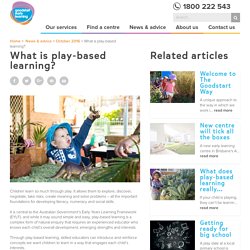
It allows them to explore, discover, negotiate, take risks, create meaning and solve problems – all the important foundations for developing literacy, numeracy and social skills. It is central to the Australian Government’s Early Years Learning Framework (EYLF), and while it may sound simple and easy, play-based learning is a complex form of natural enquiry that requires an experienced educator who knows each child’s overall development, emerging strengths and interests. 5 ways to win over parents to the importance of play in international EYFS.
"I’m not sending my child to school for them play all day.
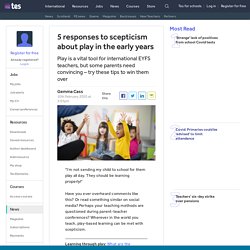
They should be learning properly! " Have you ever overheard comments like this? Or read something similar on social media? Perhaps your teaching methods are questioned during parent-teacher conferences? ZERO TO THREE. Taking Playtime Seriously. So part of encouraging play is pulling back on how much programmed goal-directed learning we expect from very young children, to leave them time for the fun of exploration, curiosity and, well, fun. But another important part may be creating environments that foster children’s play and parents’ participation and attention. Dr. Importance of play for babies & children. Australian Government Department of Education and Training (2009). Belonging, being and becoming: The early years learning framework for Australia.
Canberra: Commonwealth of Australia. Retrieved 19 June 2019 from Cole-Hamilton, I. (2011). Getting it right for play: The power of play: An evidence base. Fleer, M. (2013). Ginsburg, K.A. (2007). David whitebread importance of play report. How young children learn English through play. As we release Learning Time with Timmy – our first app for early-years learners of English – Danitza Villarroel, a teacher on our Learning Time with Shaun and Timmy course in Chile, explains the importance of learning through play, and offers a few tips for teachers new to this age group. Teaching English to pre-school children can be daunting for teachers new to this age group. Young children have shorter attention spans than older children and adults, and they're still learning their mother tongue. But teaching these learners can be enormously rewarding once you've taken a few basic principles on board. The importance of active learning Active learning means fully involving children in the learning process.
Promoting learning through play Play is a very significant part of what life means to children at this stage of their development. How baby brains develop. Early childhood development – it’s not rocket science, it’s neuroscience! I was introduced to Mine Conkbayir when she contacted me about neuroscience informing early years practice, which I think is such an exciting, and growing, area of study.
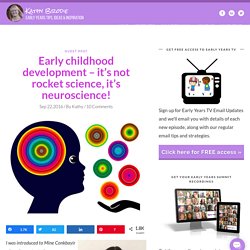
So I was very enthusiastic when she offered to do a guest post on this subject. Here she discusses how neuroscience can add another dimension to our understanding of child development: Like many individuals in this increasingly frantic world, I’m often busy juggling my responsibilities as a parent while I work and continue my studies – a very exciting journey as I try to achieve my PhD in early childhood education and neuroscience. Having been a lecturer across a range of child care and education qualifications for the past 14 years, I continue to be bewildered by the lack of consistently embedded teaching of neuroscience and early brain development across these qualifications. The Woman Who Changed Her Brain: Barbara Arrowsmith-Young at TEDxToronto.
How do you speak 'Motherese'? News BBC News Navigation Sections Previous Next. The Power of Evening Routines. The word “structure” can evoke less than positive associations. It suggests constraints, which are never a good thing, right? Wrong. It turns out that everyone benefits from a certain amount of daily structure, so long as that structure is pleasant, productive, and meaningful. Whether it’s the most inventive minds in history, or those people who live in good health past 100, a daily routine or set of micro-routines is correlated with productivity, health, and longevity. As beneficial as routines are for artists and centenarians, they are even more essential for children. Let's Talk. What do babies need in order to learn and thrive? One thing they need is conversation — responsive, back-and-forth communication with their parents and caregivers.
This interactive engagement is like food for their developing brains, nurturing language acquisition, early literacy, school readiness, and social and emotional well-being. FAQ: Raising Bilingual Children. Why want bilingual children? There are many reasons, but the two most common are: 1) The parents speak different languages (say, an American woman and a Turkish man). 2) The parents speak the same language, but live in a community where most people speak something else (say, a Korean couple living in the USA).
In the first case, both the mother and father may want to be able to use their own language when talking to their children. This is the bilingual home situation. Why does my toddler love repetition? Paediatric speech and language therapist It may test your patience when your toddler demands 'Row, row, row your boat' for the 10th time.
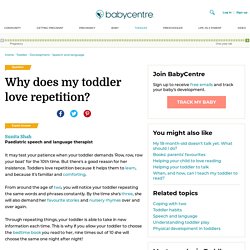
But there's a good reason for her insistence. Toddlers love repetition because it helps them to learn, and because it's familiar and comforting. From around the age of two, you will notice your toddler repeating the same words and phrases constantly. By the time she's three, she will also demand her favourite stories and nursery rhymes over and over again. Through repeating things, your toddler is able to take in new information each time. And she will love stories and nursery rhymes with repeated phrases, because she can join in. A small study has found that repetition of stories may help children to learn new words.
After hearing her favourite book many times, your toddler may even remember it well enough to add the endings to some of the sentences. Repetition is also comforting for your toddler. Have fun singing nursery rhymes and songs. Multilingual Preschoolers. It’s amazing how young children learn to converse with others. How can I help my child to start talking? (Video) Health visitor Sara Patience describes how you can help develop your child's language skills by talking and playing with her.
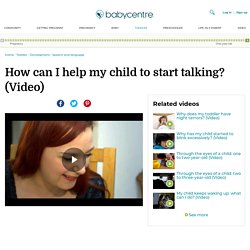
Show transcript Hide transcript. Deb Roy: The birth of a word. Leidos. Being Multilingual: You speak with an accent. I don’t.